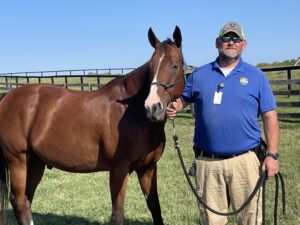By Francis LaBelle

The would-be cowboys headed off to Colorado, not on horseback, but on a Greyhound.
“I was 18 and pretty immature and I only lasted a semester at Eastern Kentucky University,” Joel Helmburg recalled. “Me and my buddy always wanted to be cowboys, so we got on a Greyhound bus – I think it was $62 in those days – and it took us 52 hours from Kentucky. We made 50 stops. It was some experience. A guy even mugged us in Kansas City. Well, he tried to mug us. Didn’t work out too good for him.”
At 44, Joel believes that, so far, his life has worked out. Now, he is helping others work theirs out.
This October, Joel celebrates his second anniversary as the farm manager and instructor for the Thoroughbred Retirement Foundation’s Second Chances Program at the Blackburn Correctional Facility in Lexington, KY. So far, he has had a hand in graduating 22 men from the Groom Elite Program, which certifies that they have been trained to care for horses. Specifically, Thoroughbred racehorses.
As a result of his success, Joel was named one of two finalists for the TIEA, Dr. J. David “Doc” Richardson Community Award. Presented by Godolphin, the award recognizes “those who have demonstrated an outstanding contribution to the Thoroughbred industry, in particular, to the greater good of the sport.”
“I am sort of on an island here and I am here about 50 hours a week,” Joel shared. “Sometimes, it feels that I spend more time with these guys than I do with my wife. But I love what I do and it is amazing to see what these horses teach the men and what they do to their insides. They teach these guys compassion and they turn them into people who care.”

This was the foundation that the TRF built upon when it started Second Chances 40 years ago at the Wallkill Correctional Facility, about 75 miles northwest of New York City. The first horse, Promised Road, was the first teacher and through the years, other former racehorses not only found a sanctuary home but showed thousands of men how to properly take care of horses, and eventually, themselves.
“I don’t call the men ‘inmates,’ Joel revealed. “To me, they are employees and they are in a training program that, hopefully, will get them a job when they are released. A lot of this is figuring out the psychology of horses. One day, I will hold the horses and have the men pick their feet. But then, I will switch it around and have the men hold the horses while I pick the horses’ feet. We’ll do that with other chores – keep switching – so everyone gets a better understanding.”
“The men start learning to pay attention and to read a horse’s body language and to check everything. I let the men work it out, figure things out for themselves. And I can tell when their lightbulb goes on.”
It figures that Joel would teach in this manner. He is from a Kentucky racing stock. His grandfather, Ledford Hudson, and his great uncle, Herman Goodpaster, trained horses at Patchen Wilkes Farm in Lexington. Goodpaster even bred White Beauty, the first all-white Thoroughbred to be registered with The Jockey Club.
Yet, it was the lure of the West that appealed to Joel. Once he moved to Colorado, he was all in on his cowboy dream. His first job was at a guest ranch, but it wasn’t quite what he envisioned. “It felt fake,” he mentioned. “All I could see was someone from a big, urban area just coming out for a week or two. I wanted to make my living on the back of a horse.”
Joel pursued cowboy life into Wyoming, but after a few years, he grew restless and a bit homesick. He moved back to Lexington.
“I needed a job and my cousin was the warden at Blackburn, so I became a corrections officer,” he recalled. “The TRF had already been established there in 1999, when the Second Chances farm manager job opened up. Young me decided I would wait and interview for it the next time. That next time didn’t come for over a decade.”
The position is coveted by many within Corrections, and also has a seniority based component in hiring. While Joel was learning the ways of the Department of Corrections, he gained valuable experience in how the entity operates so that when the time came around for the position to open again- he was ready.
“It was like, ‘Here we go!’” he said. “I got my chance to work with horses and to help people. I have so much invested in these guys. When they leave here, I want to know that I helped to give them their best shot of not going back to their old lives, but to find a better life.”
Joel’s daily routine begins at 6 a.m. He collects his employees at 6:30, and they head over to feed Blackburn’s 55 horses. As they enjoy their breakfast the horses are evaluated, and it is here that each day becomes different. The men take note of how the horses carry themselves, how much they are eating. They run their hands over the horses to detect heat, wounds, anything out of the ordinary. Each horse is special and is treated that way.
“Freehold is 27, but he is spunky,” Joel said. “Everything is harder with him, but that makes him a good teacher. Sea of Red is 24. He raced three times and he is huge – so he is another good teacher. They are all good teachers because they all have different needs. And they have good men looking out for them.”
And they have Joel looking out for everybody. That’s a given. Good cowboys always take care of their men and their horses.